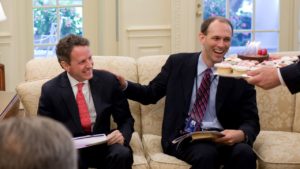
Cupcakes are served to Treasury Secretary Timothy Geithner and economic advisor Austan Goolsbee during a surprise Oval Office celebration in honor of their shared birthday, Aug. 18, 2009. (Official White House Photo by Pete Souza)
Austan Goolsbee, a former Obama administration economist who currently teaches at the University of Chicago, has been tapped to replace Charles Evans as the President of the Chicago Federal Reserve. As Nick Timiraos reports in The Wall Street Journal, Goolsbee was among many economists who blamed supply chain issues for the rampant inflation of the last two years while discounting the role played by excessive fiscal stimulus. Timiraos writes:
In the summer of 2021, Mr. Goolsbee was among the many economists who argued that increasing inflationary pressures were being driven primarily by supply-chain bottlenecks and were likely to abate largely on their own.
The Fed largely maintained that view until one year ago, when officials began withdrawing stimulus after seeing that inflation was worsening. The central bank has raised rates this year at the fastest pace since the early 1980s in an effort to slow inflation by curbing demand.
This year, Mr. Goolsbee has pointed to high inflation in Europe and other parts of the world as evidence that U.S. fiscal stimulus hasn’t been the main phenomenon explaining higher prices. But he has said that with the benefit of hindsight, the Biden administration’s financial relief programs were probably too large.
In an interview on the Fox Business Network last week, Mr. Goolsbee said it was too soon to say whether inflation had peaked. “I hope that we’ve peaked but I think that the rate at which it comes down might not be as rapid as everyone wants,” he said.
Mr. Goolsbee also said it was premature to say how high the Fed might have to raise interest rates. “Anybody saying what the terminal rate is, where the Fed is going to stop, that hinges completely on what happens to inflation,” he said. “If we started to get month after month of inflation numbers that were worse than expected, there is no terminal rate. They will keep raising rates until they stop inflation.”
Mr. Goolsbee said a recession is “not inevitable,” but warned of the risks of aggressively raising rates to wring inflation out of the economy when the economy faces constraints on the ability to supply goods and services.
Read more here.
